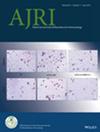SR-16234, a Unique Selective Estrogen Receptor Modulator, Suppressed Proliferation and Pain-Related Factor Expression by Inhibition of the Nuclear Factor-kappa B Pathway in Endometriotic Stromal Cells
Abstract
Problem
What is the effect of SR-16234 (SR), a selective estrogen receptor (ER) modulator, on human endometriotic stromal cells (ESCs)?
Method of Study
Endometriotic tissues were obtained from 21 patients undergoing laparoscopic surgery for ovarian endometriomas (OEs). Normal eutopic endometrium during the luteal phase was obtained from 18 patients without endometriosis. ESCs isolated from OEs and normal eutopic endometrial stromal cells (NESCs) were cultured with SR and subsequently exposed to tumor necrosis factor (TNF)-α. After 48 h of incubation, the effect of SR on cell proliferation was evaluated by the WST-8 assay. The gene expressions of inflammatory and pain-related factors, including interleukin (IL)-6, IL-8, cyclooxygenase (COX)-2, transient receptor potential vanilloid (TRPV)1, ESR1, and ESR2, were evaluated by real-time RT-PCR. The phosphorylation of Inhibitor κBα (IκBα), extracellular signal-regulated kinase (ERK)1/2, and Protein Kinase B (AKT) were evaluated by western blot analysis. ILs, prostaglandin (PG) E2, and intranuclear p65 syntheses were assessed by ELISA.
Results
SR treatment repressed TNF-α-induced proliferation by 20% in ESCs but not NESCs. SR also reduced IL-6, IL-8, COX-2, TRPV1, ESR1, and ESR2 mRNA expressions and ILs protein, and PGE2 synthesis in ESCs, whereas in NESCs, only TRPV1 mRNA expression was decreased. SR suppressed TNF-α-induced phosphorylated IκBα levels by approximately 50%, and intranuclear p65 protein was reduced by 30% compared to addition of only TNF-α in ESCs. However, SR did not affect the phosphorylation of AKT and ERK1/2.
Conclusions
SR appears to be a potential therapeutic agent for endometriosis by suppressing inflammatory and pain-related factor expressions by inhibiting the nuclear factor-kappa B pathway.

 求助内容:
求助内容: 应助结果提醒方式:
应助结果提醒方式:


